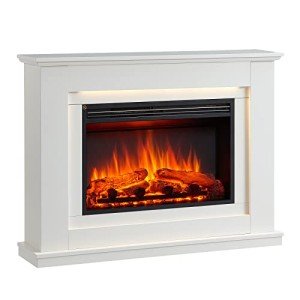You Can Explain Buy Fireplace To Your Mom
A Comprehensive Guide to Buying a Fireplace: Choosing the Right Fit for Your Home
Fireplaces have long been a main feature in homes, providing heat, atmosphere, and an event location for friends and families. Whether you're developing a brand-new home, renovating an existing space, or simply aiming to upgrade your current setup, purchasing the right fireplace can make all the difference. This guide aims to offer a comprehensive overview of various fireplace alternatives, considerations for installation, and suggestions for upkeep.
Types of Fireplaces
When thinking about a brand-new fireplace, homebuyers will discover several types to pick from. Each type includes its own distinct functions, advantages, and disadvantages. Below is a breakdown of common fireplace types:
Fireplace Type
Description
Pros
Cons
Wood-Burning
Traditional alternative using logs for fuel.
Authentic experience, strong heat source.
Needs routine maintenance, fuel storage, and ventilation.
Gas
Utilizes gas or lp, typically with a vented or ventless option.
Easy to use, less upkeep than wood.
Requires a gas line, might lose some ambiance.
Electric
Plug-and-play options with no need for venting, offering simulated flames.
No setup required, safe for apartments.
Lacks the credibility of real flames.
Ethanol
Utilizes bio-ethanol fuel in a portable or fixed system.
Clean burning, no venting required.
More expensive fuel expenses, restricted heat output.
Pellet
Burns compressed wood pellets for fuel, comparable to wood-burning.
Eco-friendly, low emissions.
Requires electrical energy for operation, specific fuel needed.
Secret Considerations When Buying a Fireplace
1. Space Size and Layout
The fireplace must be ideal for the size and layout of the space. A fireplace that is too large might overwhelm the space, while one that is too small may not effectively heat the location.
2. Heating Needs
Think about just how much heat you require for the space. An electric fireplace might be adequate for a smaller space, while a wood-burning or gas fireplace is ideal for bigger areas requiring significant heat.
3. Visual and Style
Fireplaces are available in a range of styles, from contemporary to rustic. It's vital to pick one that matches the total decoration of your home.
Popular Fireplace Styles:
- Modern sleek designs
- Traditional ornate finishes
- Rustic stone or brick
- Minimalist electric designs
4. Fuel Source
Choosing a fuel source is vital for function in addition to preference. Property owners need to consider the availability, expense, and convenience of the fuel they want to utilize.
5. Setup Requirements
Comprehend the installation requirements, as some fireplaces, especially wood-burning systems, need a chimney, while others might be more straightforward to set up. Homeowners may need to talk to experts to ensure proper installation and compliance with local codes.
6. Budget
Fireplaces can vary substantially in rate from economical electric designs to high-end gas and wood-burning systems. Aside from the preliminary purchase price, think about installation expenses and ongoing fuel expenses.
Installation Process
Installing a fireplace is a significant project that may need expert assistance. Here is an overview of the general steps included:
Planning and Design
- Assess areas and styles based upon design and heating requirements.
Get Necessary Permits
- Inspect regional structure regulations and get any required permits for setup.
Pick a Professional Installer
- Consider working with a certified professional for safety and compliance with codes.
Prepare the Installation Site
- Clear the location and set up any needed materials or assistance structures.
Follow Manufacturer Instructions
- Stick to specific standards offered by the fireplace maker during installation.
Last Inspection
- After installation, guarantee a final evaluation is performed to confirm the unit's security and performance.
Upkeep Tips for Your Fireplace
To ensure longevity and ideal performance of your fireplace, regular maintenance is crucial. Here are some ideas to keep your fireplace in excellent shape:
Wood-Burning Fireplaces
- Tidy the chimney a minimum of as soon as a year to prevent creosote accumulation.
- Usage experienced wood for less smoke and better performance.
- Check the fireplace structure for cracks or degeneration.
Gas Fireplaces
- Examine gas connections for leaks occasionally.
- Clean the glass and the burner for ideal efficiency.
- Set up annual servicing with a certified specialist.
Electric Fireplaces
- Dust and clean the system regularly.
- Check connections and change any defective parts if needed.
- Guarantee the system is shimmering clean before usage each season.
Ethanol and Pellet Fireplaces
- Keep fuel sources saved securely and far from heat.
- Tidy the burner and make sure no blockages happen.
Frequently asked questions
Q: What type of fireplace is most effective for heating?A: Gas fireplaces and
pellet ranges tend to have greater effectiveness, transforming more energy to heat compared to wood-burning options.
Q: Can I install a fireplace in any room?A: While lots of spaces can accommodate a fireplace, ventilation, offered area, and local policies might impact feasibility.
Q: Are electric fireplaces safe?A: Yes,
electric fireplaces are typically very safe, include no genuine flames, and typically consist of functions that avoid getting too hot.
**Q: How do I pick the right size fireplace?A: Consider the square video of the space and seek advice from suppliers about advised BTU rankings for heating efficiency. Purchasing a fireplace is a substantial
choice that can considerably boost your home. By thinking about the type of fireplace, your heating needs, installation requirements, and continuous maintenance, property owners can pick the best system to meet their preferences and enhance their home for several years to come. Whether Fireplaces And Stoves lean towards a traditional wood-burning fireplace or a modern electric solution, the ideal fireplace will provide warmth, convenience, and style that can be treasured for generations.  **
**